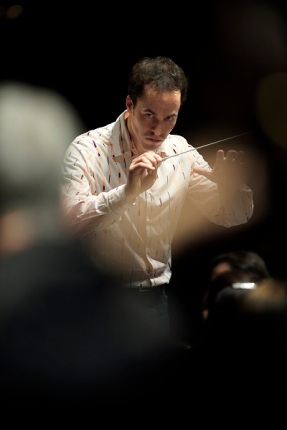
Johannes Debus (Photo – Michael Cooper)
The Canadian Opera Company’s winter season begins soon, featuring two long operas led by the same maestro, namely Johannes Debus. Siegfried, the penultimate of the Wagner operas in the Ring Cycle premieres January 23rd, while Mozart’s Marriage of Figaro follows on February 4th. Between the opening and the final performance February 27th Debus will conduct sixteen performances.
Debus made his COC debut conducting War & Peace in 2008, one of the best things the COC have ever done. No wonder then that within a few months COC General Director Alexander Neef would sign up the brilliant young conductor as the COC Music Director. Debus & the COC Orchestra continue to be the cornerstone of the company, especially in a season like this one. As the COC’s most indispensable performer this winter I had to ask Debus a few questions: about his life and his work.
1) Are you more like your father or your mother?
I grew up in a small, yet pretty town in western Germany: father archivist, mother a trained librarian, three siblings… – I think we could call it an academic middle-class household. Life was simple and not fancy or flamboyant at all, yet I can say that I had a happy and sheltered childhood. My parents did care about their kids, and they tried to give us the support we needed to explore our own interests and live our own little dreams.
I don’t know, if I’m more like my father or my mother, but I know that I inherited certain human values and virtues that were key to them both: sense of responsibility, honesty, fairness, modesty, altruism, reliability etc. My fingers are crossed I can live up to their high standards.
2) What is the best thing about what you do?
Being a conductor I would say it’s the thrill of a great performance that excites me the most of what I’m doing. Being a conductor I also quickly realize, how much I rely on other people. So let’s say it’s the thrill of working together and creating something extraordinary with likeminded people.
On a different level it’s the combination and range of things my job comes with – pure artistic subject matters take turns with simply ‘profane’ practical ones. It keeps me inspired and grounded at the same time. The ivory tower has an exit door to the outside world.
3) Who do you like to listen to or watch?
I’m attracted to beauty that comes from the rare combination of profound truthfulness, wit, esprit, (quirky) humour, boldness, vision and a dash of indescribable mystery. A soccer team performing like a corps de ballet, a majestic sunrise, Gigli singing “Mamma”, the acrobat/pantomime/clown/busker at the street corner, the ruins of an ancient temple, a stranger passing by – everything that belongs to and enriches the ‘Flying Circus’ of our lives…
4) What ability or skill do you wish you had, that you don’t have?
I would like to have legs to dance, arms to fly and hands to write music…
5) When you’re just relaxing and not working what is your favourite thing to do?
As I spend most of my time inside, it can be fairly relaxing to go for a walk/run and breathe some fresh air. My bicycle is also a good companion for a little ‘air-my-brain cruise’.
*******
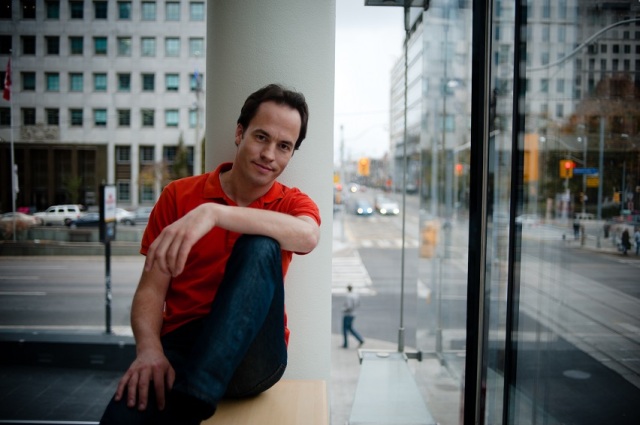
Johannes Debus (photo: Bo Huang)
More questions about work as COC Music Director.
1) Conductors as a profession live long lives. You were conductor for Tristan und Isolde in 2013 and Die Walküre in 2014, and now with Siegfried in 2016 you’re again leading the COC orchestra in an immense long work. Are these operas like a marathon for the conductor –requiring you to train—or is this music actually making you healthier?
The biggest challenge conducting such extensive operas as Siegfried is to stay on top of things and not to loose track of the overall shape and the architecture of the scenes and each act. You have to know where the peaks and landmarks are and how to work organically towards them.
In that respect we can compare conducting immense long pieces with running a marathon. It is ultimately your mind, enabling you to conquer such dimensions and not being completely exhausted afterwards. And with growing experience you learn to know, how much you get involved physically. Small gestures are often more than enough.
2) Mozart’s Nozze di Figaro and Wagner’s Siegfried are a contrasting pair of works even though they’re both long. One is through-composed, while the other has numbers (recitative, arias and ensembles). Nobody seems to write this way anymore, whether we’re speaking of long music-dramas or comic opera. If you could push a button and magically get a composer to create a work in the same style as ONE of these two very different operas, which would you choose and why?
Before I push the button and get a composer to write music like Mozart or Wagner, I want to explore the means and the style our own time offers to create new masterpieces of such perfection and esprit as Mozart’s Nozze or of such visionary, bold conception and electrifying magnitude as Wagner’s Siegfried. Mozart and Wagner both take us in very different ways on a journey through essential, archetypal questions of human life. And there are creative minds around us who face those same archetypal, essential questions, yet will find their own ways to answer it – with their own means and in their own style.
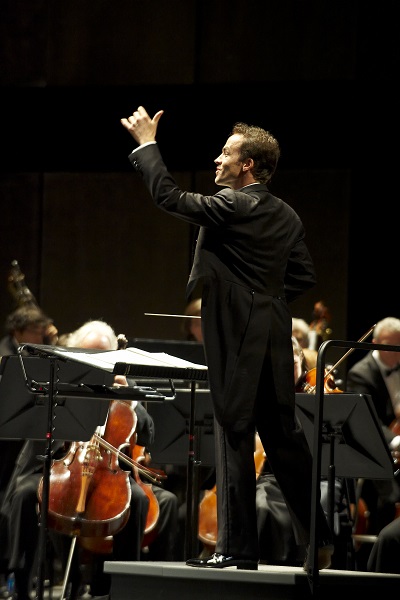
The COC Orchestra and Conductor Johannes Debus. (Photo – Michael Cooper)
3) What is your favourite passage in each opera, and if you could perhaps explain why it’s a favourite?
In Siegfried everything seems to gravitate towards Brünnhilde’s awakening. It’s hard to imagine anything more ecstatic, overwhelming and thrilling than the moment when the 100-people orchestra in the pit starts this climactic cresc. on “Heil dir, leuchtender Tag!” Admittedly I’m not immune to the shivers it gives me, even if I know that it is an almost obvious, just so well calculated and crafted effect. Let’s call it my ‘guilty pleasure’ moment in Siegfried. Less obvious, yet incredibly exciting for me is most of Act 1: bold, wild, rather experimental, harmonically utterly complex and by a Beethoven-like rhythmical furor driven. Wagner might have never been as ‘avantgarde’ as here.
To single out one moment in Le Nozze di Figaro is very hard. Every aria, every ensemble, even the recits seem to be of the greatest perfection and profound beauty. One pearl follows another and all together they form a most amazing pearl chain.
4-Please describe how you prepare for your first rehearsal of an opera such as Siegfried or Nozze di Figaro.
The preparation for an opera no matter what is in general the same: I study the score which often includes to play the score (in slow motion) at the piano, read the libretto, find out what the words mean – a dictionary is an important companion for that, gather some knowledge about the composer and his/her time and the time she/he wrote that specific piece, gather some knowledge about possible performance traditions. To gather information about performance traditions certain recordings can be helpful, i.e. it is surely not a bad idea to listen to some Wagner from Bayreuth or even better to go to Bayreuth and get an idea of the special sound you get there due to Wagner’s revolutionary acoustical invention of the covered pit. At the end however it is your personal choices, your personal taste that defines how you bring each piece to life. And it’s important to have made your thoughts about your own approach before rehearsals start.
5-Do you have a favourite composer whose music you love to conduct and/or hear?
Bach is my composer of choice for the desert island, however I would miss many others. And gladly I can keep Bach for the desert island, as I get to conduct so many of the other great ones here at the COC and elsewhere. I like the fact that at the COC I can go from the early beginnings in operatic history to the most recent creations. The spectrum is wide, undogmatic and pluralistic. As long as the piece speaks to me, as long as I feel a connection to it, I feel good about performing it.
6-Is there a teacher or an influence you’d care to name that you especially admire?
At the age of five onwards I had a wonderful chorus master who not only knew how to give young people access to the beauty of music, he also impressed me with his wide cultural knowledge in general. He could equally explain to you James Joyce’s Ulysses as he would give you an insightful analysis of a fresco by Piero della Francesca or would share his joy and enthusiasm about a Beatles’ song.
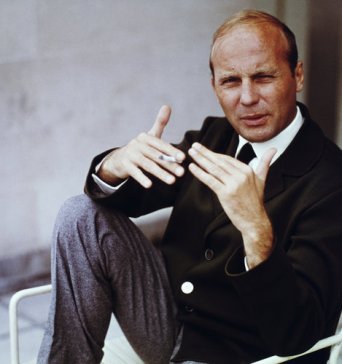
Hans Werner Henze. Credit Erich Auerbach/Hulton Archive, via Getty Images
Later in my life I was extremely fortunate to meet with Hans Werner Henze, the great German composer, and to share a profound friendship for more than ten years until his death. I wish he could have taught me composing, but that’s a talent I don’t own (see question no. 4). Yet he opened my ears, eyes and my heart to the magnificence of life. He was clearly thinking big, and he was living the richness and freedom of life to a degree that was unknown to me before. His music can tell you all about it.
*****
Johannes Debus gives the downbeat for Wagner’s Siegfried on January 23rd at the Four Seasons Centre, first of seven performances. The Marriage of Figaro follows on February 4th. For further information click here.
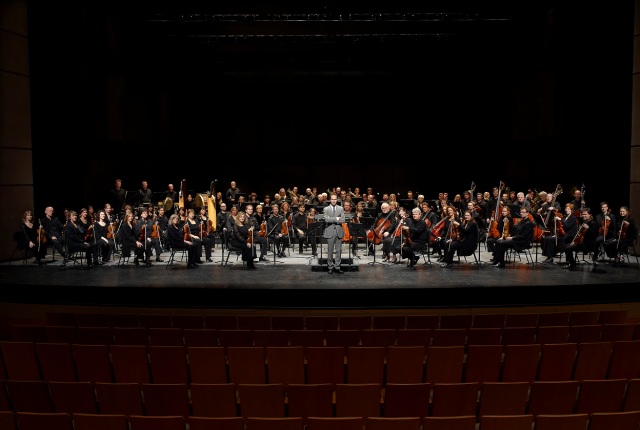
Canadian Opera Company Music Director Johannes Debus with the COC Orchestra (Photo – Michael Cooper)

Pingback: La bonne chanson @ RBA | barczablog
Pingback: COC Siegfried: Love on the rocks in white PJs | barczablog